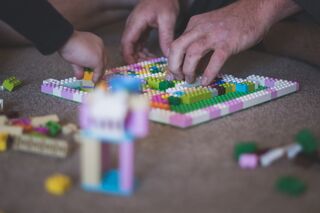Parenting
Why Perfectionists May Become Helicopter Parents
Perfectionistic parents hover over their children to ensure a good outcome.
Posted September 22, 2020 Reviewed by Abigail Fagan
Helicopter parenting is another term for over-parenting, which has become the norm for so many of us. Over-parenting is a problem because it means that parents interfere with normal child development by doing too much for the kid. Most of the research on this issue has focused on the negative impact on children, including mental health problems and substance abuse in young adulthood. But what leads parents to become helicopter parents in the first place? According to a new paper, perfectionists are more likely to over-parent their kids.
"All the research thus far on helicopter parenting or over-parenting, has focused on what are the outcomes for the children who are the recipients of over-parenting, and no one has been looking at who does this in the first place," said University of Arizona researcher Chris Segrin in a press release. "We think knowing more about the motivations of the parents has important implications for understanding what happens to the children."

In his prior research, Segrin had already found that anxious parents are more likely to engage in over-parenting. That's because anxious parents are trying to avoid risks to their children. Sometimes they’ve made mistakes in their own lives and would like to spare their children from the same. But going from anxious parenting to over-parenting means crossing the line into interfering with a child’s development, and Segrin does not believe that has to happen. To him, anxious parenting is simply “one of the ingredients in the over-parenting stew.”
Parenting is a ShouldStorm of anxiety
Parents live in a culture of constant criticism that values anxiety as almost a moral duty. It’s a culture I call the ShouldStorm, and it’s constantly telling parents that if they should be worrying about their kids or they don’t love them enough. If they try to stop worrying so much, parents are told they are at risk of being dangerously neglectful. It’s a scary world out there, says the ShouldStorm, and you should be anxious about your kids.
But another key feature of the ShouldStorm culture is the way it pushes perfectionistic parenting. Parenting should not only be involved, but it should be close to perfect. Everything parents do should be the right thing, because parents who make mistakes might just mess their child up for life. In trying to get it right and avoid risk, parents caught in the ShouldStorm miss the very real risk they are taking instead. That is the risk of derailing their child’s normal developmental progression.
Having observed this in my clinical practice, it was validating to find that these researchers noted the same phenomenon. Segrin and his co-authors wanted to see if parental perfectionism was a contributor to over-parenting the way anxiety is.
Perfectionists are more likely to over-parent
For the purposes of the study, the authors defined perfectionism as the psychological desire of wanting to be highly successful and to receive praise for it. And that’s an issue when it comes to parents because they can get drawn into over-parenting in order to make sure outcomes for their children are perfect. Further, parents can easily feel that how their child is doing reflects on them, and they are not crazy to think so. Parents tell me every day about the shaming they experience over their children, for the littlest things.
Still, it’s more intense for perfectionists. "They want to live vicariously through their children's achievements. They want to see their children achieve because it makes them look good," Segrin said. "I'm not saying they don't care about their children; of course they do. But they measure their self-worth by the success of their children. That's the yardstick that they use to measure their own success as a parent.”
That means that parents don’t let go and allow their children to grow into age-appropriate autonomy when they need to. Instead, they do things that the child could easily do themselves because the parent needs to control the outcome, Segrin explained.
The authors ran two studies, which were published together in the journal Couple and Family Psychology: Research and Practice. The first study looked at 302 parents of young adult children and had the parents complete surveys on perfectionism and over-parenting behaviors. The second study looked at 290 pairs of young adults and their parents. In that case, both the parents and their young adult children completed assessments of helicopter parenting, anxious parenting, and parental conditional regard.

The study results showed a strong and consistent association between perfectionism in parents and over-parenting behaviors. When overparenting was present, the young adult children perceived it and reported being on the receiving end of both helicopter and anxious parenting. The good news? The adult children did not report a significant rate of parental conditional regard.
Mothers are more likely to be the helicopter parent
The study also found that when there was a helicopter parent, it was more likely to be the mother than the father. Segrin was quick to point out that there are dads who are helicopter parents too. It is just that mothers tend to do more childcare.
"We know that in our culture, for better or worse, women end up getting strapped with child-rearing responsibilities to a much greater extent than men, so it stands to reason that as the child matures and gets older, the mother sort of stays on board with that job," he said.
Indeed, the well-documented lack of support American mothers experience can only increase the feeling of anxiety moms feel. The way the ShouldStorm tells mothers they should do it just right and then criticizes them while they struggle to manage work and home sets moms up for this. Helicopter parenting feels like a cultural setup.
Segrin wants perfectionistic mothers who are helicopter parents to recognize their worth outside of parenting. "I sometimes see, especially in mothers, that they define their whole universe as 'mother' — not spouse, not wife, not worker, not hobbyist but 'mother.' I think those blurred boundaries between parent and child can be harmful to the psychological landscape of the parent," Segrin said.
"We need the parents to realize they have some element of their own life — whether it's their career, their personal relationships, their hobbies — that's independent of their role as a parent, so they don't get caught up in this trap of wanting to just keep parenting their children until they're 40 years old."




